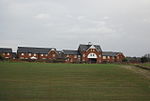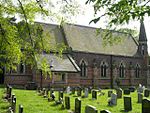All Saints' Church, Weston, Cheshire
19th-century Church of England church buildingsBorough of Cheshire EastChurch of England church buildings in CheshireDiocese of ChesterEngvarB from April 2014 ... and 3 more
Gothic Revival architecture in CheshireGothic Revival church buildings in EnglandGrade II listed churches in Cheshire

All Saints' Church is in Main Road, Weston, Cheshire, England. It is an active Anglican parish church in the deanery of Nantwich, the archdeaconry of Macclesfield, and the diocese of Chester. Its benefice is combined with that of St Mark, Shavington. The church is recorded in the National Heritage List for England as a designated Grade II listed building.
Excerpt from the Wikipedia article All Saints' Church, Weston, Cheshire (License: CC BY-SA 3.0, Authors, Images).All Saints' Church, Weston, Cheshire
Cemetery Road,
Geographical coordinates (GPS) Address External links Nearby Places Show on map
Geographical coordinates (GPS)
| Latitude | Longitude |
|---|---|
| N 53.0667 ° | E -2.4003 ° |
Address
All Saints Church
Cemetery Road
CW2 5LF , Weston and Crewe Green
England, United Kingdom
Open on Google Maps







